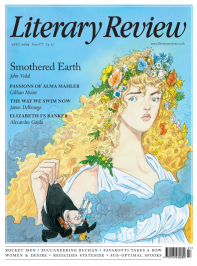Malcolm Forbes
Love & Loss
The Hiding Game
By Naomi Wood
Picador 374pp £14.99
Naomi Wood’s third novel is as well timed as it is well written. Coinciding with the centenary of the founding of the Bauhaus, The Hiding Game traces the chequered friendships, messy relationships, thwarted hopes and misplaced dreams of a set of students at the German art school. The narrator, Paul Beckermann, explains at the outset, ‘This is my account of what happened to us in the 1920s: a decade of resplendence and tragedy.’ But Paul sells himself short: his narrative in fact extends into the 1930s. As war begins to look likely, an engaging tale filled with jealousies and rivalries turns into a dark, compelling drama about betrayal, revenge and the cost of loving too much.
Paul’s story begins in Weimar in 1922 when he is eighteen. He clicks with five of his fellow first-year ‘Bauhaus babies’ and falls for one of them, Charlotte, but keeps his feelings under wraps. Two other members of the group, Walter and Jenö, go further and enjoy a brief

Sign Up to our newsletter
Receive free articles, highlights from the archive, news, details of prizes, and much more.@Lit_Review
Follow Literary Review on Twitter
Twitter Feed
The son of a notorious con man, John le Carré turned deception into an art form. Does his archive unmask the author or merely prove how well he learned to disappear?
John Phipps explores.
John Phipps - Approach & Seduction
John Phipps: Approach & Seduction - John le Carré: Tradecraft; Tradecraft: Writers on John le Carré by Federico Varese (ed)
literaryreview.co.uk
Few writers have been so eagerly mythologised as Katherine Mansfield. The short, brilliant life, the doomed love affairs, the sickly genius have together blurred the woman behind the work.
Sophie Oliver looks to Mansfield's stories for answers.
Sophie Oliver - Restless Soul
Sophie Oliver: Restless Soul - Katherine Mansfield: A Hidden Life by Gerri Kimber
literaryreview.co.uk
Literary Review is seeking an editorial intern.